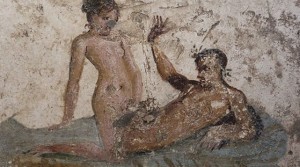The centuries-old wall paintings discovered in Lupanar, a historic Pompeii brothel, have shed insight into the sexual activities of ancient Italians, with depictions of explicit sex acts.
The brothel was a hangout for the wealthy and powerful before the Roman city was wiped out by a volcanic eruption in 79 AD.
As the Lupenar of Pompeii was the center of the doomed city’s red light district, researchers believe the erotic paintings of group sex and other acts may have indicated the kinds of services that were offered by Pompeii prostitutes at the time.
Two thousand years ago, before the devastating volcanic eruption that wiped out the Roman city of Pompeii, prostitution was a legal institution where slaves — many brought over from Greece and other countries under Roman rule — constituted the primary workforce.
Prostitutes at the brothel included both females and males, where even young men sold their bodies — to customers of both sexes. One classic studies professor said: “Married men could sleep with anyone as long as they kept their hands off other men’s wives. Married women were not supposed to have sex with anyone else.”
The brothel is the most frequently visited building in Pompeii, even though it is neither the most luxurious nor the most important of structures there.
In each of the paintings adorning the walls and ceilings of the building, visitors are met by striking, explicit murals of couples engaged in different sexual acts, and historians believe the images were not only decorative, but functional as well, serving as catalogues that detailed the specialty of each prostitute.
Its walls are scored with inscriptions left by past customers and prostitutes, including similar phrases to those one would find in a modern day bathroom, including lewd comments by men boasting of their sexual prowess.
A Unesco World Heritage Site, the Lupanar of Pompeii is of special significance because unlike other brothels of the time, it was designed exclusively to facilitate brothel appointments, and served no other alternative purpose.
Source: Daily Mail
Ask me anything
Explore related questions





